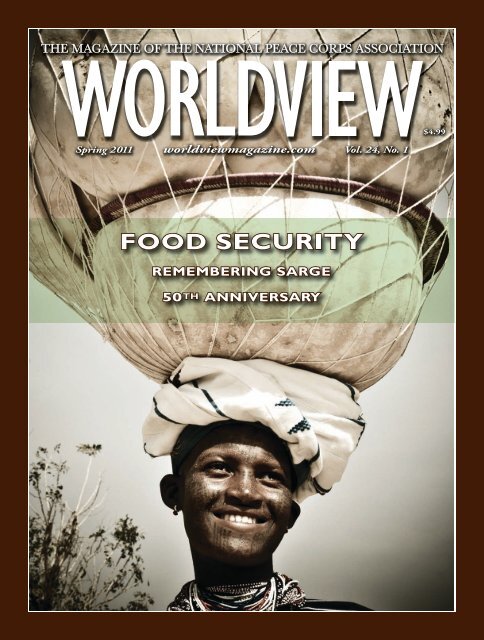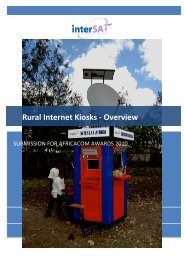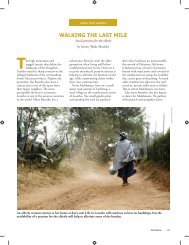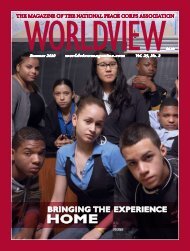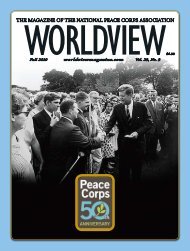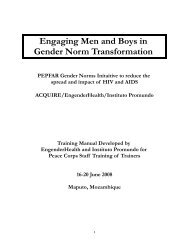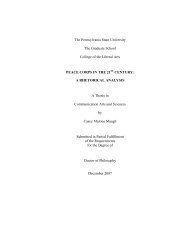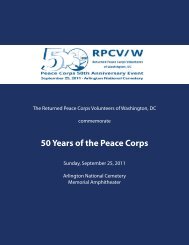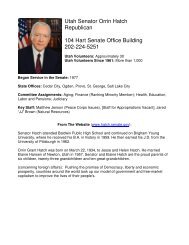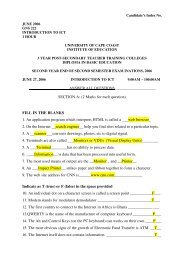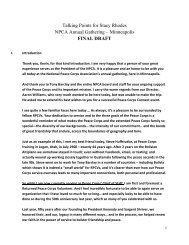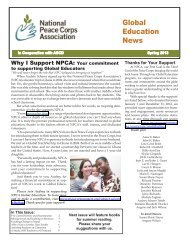Most recent issue of WorldView magazine - National Peace Corps ...
Most recent issue of WorldView magazine - National Peace Corps ...
Most recent issue of WorldView magazine - National Peace Corps ...
- No tags were found...
You also want an ePaper? Increase the reach of your titles
YUMPU automatically turns print PDFs into web optimized ePapers that Google loves.
Bringing the world hometo theFifty years <strong>of</strong> <strong>Peace</strong> <strong>Corps</strong>.Twenty years <strong>of</strong> <strong>Peace</strong> <strong>Corps</strong> Fellows at Johns Hopkins.Hopkins Nursing and <strong>Peace</strong> <strong>Corps</strong>—a shared passion, commitment, and community spirit:U.S. News & World Report)
A <strong>magazine</strong> <strong>of</strong> news and comment about the <strong>Peace</strong> <strong>Corps</strong> worldWoRldViewKevin F. F. Quigley, publisherCatherine L. AlstonErica BurmanSarah H. HaughtChristopher KloseAnthony PariseShannon ScribnerAngene WilsonErica Burman, editorContributorsGe<strong>of</strong>f BendeckJoAnna HaugenChristoph HerbyMolly MattessichJonathan PearsonJoby TaylorJack WilsonWoRldview adveRTiSIngPartyke Communicationssuepartyke@cs.com540 374 9100<strong>WorldView</strong> (ISSN 1047-5338) is published quarterlyby the <strong>National</strong> <strong>Peace</strong> <strong>Corps</strong> Association to providenews and comment about communities and <strong>issue</strong>s<strong>of</strong> the world <strong>of</strong> serving and returned <strong>Peace</strong> <strong>Corps</strong>volunteers. <strong>WorldView</strong> © 1978 <strong>National</strong> <strong>Peace</strong> <strong>Corps</strong>Association.Periodicals postage paid at Washington, D.C. & additionalmailing <strong>of</strong>fices.POSTMASTERPleased send address changes to<strong>WorldView</strong> <strong>magazine</strong><strong>National</strong> <strong>Peace</strong> <strong>Corps</strong> Association1900 L Street NW, Suite 404Washington, DC 20036-5002ADVERTISINGQuestions regarding advertising should be sent tosuepartyke@cs.com orPartyke Comunications145 Harrell Road, Suite 119Fredericksburg, VA 22405SUBSCRIPTIONSMagazine subscriptions may be purchased from the<strong>National</strong> <strong>Peace</strong> <strong>Corps</strong> Association by check or creditcard. Prices for individuals are $25 and institutions$35 [add $10 for overseas delivery]. Order formsare also available on the NPCA website at www.peacecorpsconnect.org or www.worldview<strong>magazine</strong>.comEDITORIAL POLICYArticles published in the <strong>magazine</strong> are not intendedto reflect the views <strong>of</strong> the <strong>Peace</strong> <strong>Corps</strong>, or those <strong>of</strong>the <strong>National</strong> <strong>Peace</strong> <strong>Corps</strong> Association, a nonpr<strong>of</strong>iteducational membership organization for those whoselives are influenced by <strong>Peace</strong> <strong>Corps</strong>. The NPCA isindependent <strong>of</strong> the federal agency, the <strong>Peace</strong> <strong>Corps</strong>.EDITORIAL SUBMISSIONSLetters to the editor are welcomed. Unsolicitedmanuscripts, photographs, or other illustrations willbe considered. The editors prefer written proposalsbefore receiving original material. Send queries ormanuscripts to the editor at news@peacecorpsconnect.orgor by mail to the NPCA address.All inquiries can be addressed to the appropriateperson at NPCA by fax at 202 293 7554 or by mailto NPCA, or through the NPCA website at www.peacecorpsconnect.org or www.worldview<strong>magazine</strong>.comWORLDVIEWSpring 2011 Volume 24 Number 1Food Securitypublished by the <strong>National</strong> <strong>Peace</strong> <strong>Corps</strong> AssociationIN MEMORIAMIn Remembrance <strong>of</strong> Sargent Shriver:A Twenthieth Century giantby Joby Taylor, Ph.D. 1050th ANNIVERSARYLargest Gathering <strong>of</strong> <strong>Peace</strong> <strong>Corps</strong> Volunteers in 50 Years:House parties around the globe celebrate the 50th anniversaryby Molly Mattessich 1650th Anniversary Celebrations 20Letter from The Director <strong>of</strong> The <strong>Peace</strong> <strong>Corps</strong>by Aaron S. Williams 24FOOD SECURITYIt’s the Inequality Stupid:Dealing with food prices and instabilityby Shannon Scribner 26Strengthening Communities Through HolisticAgricultural Programsby Catherine L. Alston 28Six Food Security Resources You Can Use:Here are some places to startby Erica Burman 30COVERA Fulani woman carries a calabash kitchen set, the dowry for her sister’s wedding inGoumori, Benin. Photo by Christoph Herby (Benin 08-10), a self-taught photographerand documentary storyteller. © 2011 Pulaku Project.www.worldview<strong>magazine</strong>.com<strong>Peace</strong> <strong>Corps</strong>Andy SmithKaren Robinson/Oxfamwww.<strong>Peace</strong><strong>Corps</strong>Connect.org <strong>WorldView</strong> Spring 2011
NPCA <strong>Peace</strong> <strong>Corps</strong>Clockwise from top left:President John F. Kennedy hands Sargent Shriverthe pen used to sign legislation creating the <strong>Peace</strong><strong>Corps</strong>. Sen. Hubert Humphrey is to the left <strong>of</strong> thepresident. March 1961.Sargent Shriver with his daughter Maria Shriver andgrandchildren at the 41st anniversary celebration.Sargent Shriver addresses Returned <strong>Peace</strong> <strong>Corps</strong>Volunteers at the 25th anniversary <strong>of</strong> the <strong>Peace</strong><strong>Corps</strong> in Washington, D.C., 1986.Sargent Shriver addressing “Sarge’s kids” at the 41stanniversary <strong>of</strong> the <strong>Peace</strong> <strong>Corps</strong>, 2002.NPCANPCAget good things done. Developing thisformula for practical idealism becameShriver’s ongoing experiment as hedesigned and launched program afterprogram. Serving in the <strong>Peace</strong> <strong>Corps</strong>or VISTA, volunteering for SpecialOlympics, or providing Legal Servicesfor the Poor, in addition to meeting realhuman needs, also <strong>of</strong>fers us a chanceto expand our moral imagination.At its best, our participation in theseefforts provokes reflection on the lifewe want to live, it gives us new insightinto the lives <strong>of</strong> others, and it redoublesour commitment. This is the spiralingelegance <strong>of</strong> Shriver’s big idea, that thelife <strong>of</strong> service is its own antidote todespair and cynicism. And his own lifeexample was an untiring witness thatthis is both the most effective and thehappiest way to be in the world.Shriver’s faith in this path andits outcome—his unwavering andenthusiastic belief that we can buildpeace through service—is a great giftto the world. His legacy, like his life, isturned toward the future; it will grow aseach new generation catches the fire <strong>of</strong>his world-changing idea by answeringthe call to serve.Sarge, you will be sorely missed,dearly remembered, and alwaysbeloved. I pledge my own best effort tokeep your faith, and, here at the ShriverCenter, we’ll keep working toward thatformula for practical idealism. “Welldone good and faithful servant…enterthou into the joy <strong>of</strong> thy Lord.”Joby Taylor Ph.D. (Gabon 91-93, <strong>Peace</strong><strong>Corps</strong> Fellows/USA 99-01) is Director <strong>of</strong>the Shriver <strong>Peace</strong>worker Fellows Programand Affiliate Faculty; Language, Literacy& Culture; at the University <strong>of</strong> MarylandBaltimore County.www.<strong>Peace</strong><strong>Corps</strong>Connect.org <strong>WorldView</strong> Spring 2011 11
Around the NPCAOn the Hill:2011 Day <strong>of</strong> Action for <strong>Peace</strong> <strong>Corps</strong>by Jonathan PearsonFifty NPCA citizen advocates.One hundred and fivecongressional meetings.Information distribution to morethan 530 congressional <strong>of</strong>fices. Morethan 500 volunteer hours devoted tobringing the world back home.In this case, the world was broughtto Capitol Hill during NPCA’sseventh annual <strong>National</strong> Day <strong>of</strong>Action in Support <strong>of</strong> the <strong>Peace</strong> <strong>Corps</strong>.Korea RPCV Richard MacIntyre,meeting with his CongressmanMichael Michaud (D-ME), was part<strong>of</strong> the Hill contingent that covered alleras <strong>of</strong> <strong>Peace</strong> <strong>Corps</strong> service. Advocatesmade the case for continued strongsupport for <strong>Peace</strong> <strong>Corps</strong> funding.Visit the advocacy section<strong>of</strong> the NPCA website, www.<strong>Peace</strong><strong>Corps</strong>Connect.org/advocacy, t<strong>of</strong>ind resources and information thatcan help you advocate for a strongand independent <strong>Peace</strong> <strong>Corps</strong>.House RPCVs IntroduceCommemorativeLegislationLegislation to authorize the creation <strong>of</strong>a commemorative work in the nation’scapital to mark the historic and enduringsignificance <strong>of</strong> the establishment <strong>of</strong>the <strong>Peace</strong> <strong>Corps</strong> in 1961, and theideals on which it was founded hasbeen re-introduced in the House <strong>of</strong>Representatives. Authored by RPCVCongressman Sam Farr (D-CA) andAll Photos: NPCAAbove: NPCA Intern Liana Bennett and Sean McLernon (Niger 09-11) helped stuff packets inthe days leading up to the Day <strong>of</strong> Action.Center top: Advocates teamed up and distributed materials to every congressional <strong>of</strong>fice.Right top: Richard MacIntyre (Korea 67-69) met Congressman Michael Michaud (D-ME) todiscuss the importance <strong>of</strong> <strong>Peace</strong> <strong>Corps</strong>.Right lower: It wasn’t just meetings. Advocates wrote thank you notes and filled out meetingreport forms throughout the day.Center lower: As Massachusetts citizens made phone calls and sent emails, the Capitol Hill team<strong>of</strong> Judith Whitney Terry (Honduras 67-68), Bob Terry (Bangladesh 61-63; India 66) and ScottSharland (St. Vincents and Grenadines 08-10) met with Massachusetts congressional <strong>of</strong>fices.12 <strong>WorldView</strong> Spring 2011 <strong>National</strong> <strong>Peace</strong> <strong>Corps</strong> Association
Around the NPCASHORT-TERM, ON DEMAND CAPACITY BUILDINGEncore Makes Its Markby Christopher Klose“The <strong>Peace</strong> <strong>Corps</strong> Volunteer comes to you as one to treat and be treated equally, to give and to receive,in the effort to reach the aspirations <strong>of</strong> all…”— Anonymous PC India staff, circa 1968experience here hasbeen fantastic. I’ve“Thelearned so much aboutAfrica and its people. I hope I’vegiven as much as I have received.”So blogged Larry Badger (Azerbaijan05-07) at the end <strong>of</strong> his <strong>recent</strong> threemonthservice as an Encore Volunteerworking with the InternationalFertilizer Development Center’s(IFDC) East and Southern AfricaDivision (ESA) based in Nairobi,Kenya.A writer and videographer, Badgerwas producing three new training videosfeaturing local farmers and focusedon IFDC’s core mission <strong>of</strong> increasingagricultural productivity and foodsecurity. IFDC is a public internationalorganization with projects in more than100 countries.Working with both public andprivate partner organizations, Encorevolunteers like Badger have providedmore than 12,500 hours <strong>of</strong> technicalexpertise to 22 capacity buildingprojects in the developing world overthe last four years. They have completedchallenging assignments in Peru,Armenia, India, Indonesia, Zambia,Cameroon, Tanzania, Mozambique,Ethiopia and Kenya.“The Encore/NPCA approach isunique,” says NPCA President KevinQuigley. “Unlike similar programspromoting RPCV involvement, itis demand-driven. Job assignmentsare designed by the host institution,like IFCA, for example. EncoreVolunteers are chosen to fit a veryspecific, demanding bill.”Last November, in honor <strong>of</strong> the 50thanniversary <strong>of</strong><strong>Peace</strong> <strong>Corps</strong> andto expand thenumber, rangeand impact <strong>of</strong>targeted projects,Encore becamea Joint Project <strong>of</strong>the <strong>National</strong> <strong>Peace</strong><strong>Corps</strong> Association(NPCA)and EncoreService <strong>Corps</strong>International(Encore).“The advantageswere obvious,” recalls Encore chairpersonRussell E. Morgan (Kenya 66-69).“Our success in developing effectiveworking relationships with partnerssuch as the UPS Foundation, UnitedWay International, The Abbott Fund,and Johnson & Johnson, who co-fundour projects, combined with NPCA’smembership <strong>of</strong> experienced RPCVswith their passionate commitment tocontinued service.”Perhaps no one personifies the Encoreopportunity better than Linda Layfield(RPCV Haiti 81-88; Staff Uzbekistan,Madagascar, The Baltics, Lesotho 00-07), who just finished serving in NewDelhi, India with Operation ASHA(OpASHA). She says, “It has beenan incredible volunteer experience.Operation ASHA is growing rapidly.They really work with the poorest <strong>of</strong>the poor. It is poised to expand all overthe country and they have just openedprograms in Cambodia and Morocco.”Matched with specific assignments,as Layfield was, Encore volunteers serveLinda Layfield (Haiti 81-88) teaching proposal writing to OpASHAstaff.from as little as six weeks to nine monthsor longer. Expenses are covered eitherby a mix <strong>of</strong> local and internationalfunding or through partial support bythe volunteer her/himself. The localinstitution usually provides food andlodging. Specific impact evaluations aredeveloped in advance and the results arejointly reviewed by the host institutionand Encore/NPCA in preparation forfollow up assignments. The experiencelearned from each service assignmentis then integrated back into Encore’sorientation procedures.NPCA handles Encore operations,including the recruitment andplacement <strong>of</strong> volunteers, projectdevelopment and outreach. Governanceis provided by an Advisory Committeemade up <strong>of</strong> representatives <strong>of</strong> bothorganizations. NPCA Vice PresidentAnne Baker and Program Assistant ErinMadsen staff Encore.Christopher Klose (India 68-70) is theco-founder <strong>of</strong> Encore Service <strong>Corps</strong>.Encore Service <strong>Corps</strong>14 <strong>WorldView</strong> Spring 2011 <strong>National</strong> <strong>Peace</strong> <strong>Corps</strong> Association
W O R C E S T E RM A S S A C H U S E T T SPreparingglobal business leadersand change agentsClark University Graduate School <strong>of</strong> Management isproud to be a new <strong>Peace</strong> <strong>Corps</strong> Fellows/USA partner,and <strong>of</strong>fers generous scholarships to former <strong>Peace</strong> <strong>Corps</strong>volunteers.EARNED EXCELLENCETHE BEST BUSINESS SCHOOLSIN THE WORLD•MBADevelop the skills required<strong>of</strong> business leaders in theglobal economy. Earn upto two concentrations inaccounting, finance, globalbusiness, informationsystems, management,marketing, or socialchange.• MBA inSocial ChangeCombine your businessstudies with elective coursesfocused on environmentalsustainability, social justiceand economic well-being.Prepare to lead in a diverserange <strong>of</strong> fields, frommicr<strong>of</strong>inance and ethicalinvesting to sustainabledevelopment and corporatesocial responsibility.• MBA/Master <strong>of</strong> Arts inCommunity Developmentand Planning• MBA/Master <strong>of</strong> Arts inEnvironmental Science andPolicyCombine an MBA and Masters <strong>of</strong> Arts into a singlecourse <strong>of</strong> study with a dual degree <strong>of</strong>fered incollaboration with the University’s Department <strong>of</strong>International Development, Community, andEnvironment.Visit www.clarku.edu/gsom or contact us at 508.793.7406 or clarkmba@clarku.edu
50th AnniversaryLARGEST GATHERING OF PEACE CORPS VOLUNTEERSIN 50 YEARSHouse Parties around the globe celebrate the 50th Anniversaryby Molly MattessichNearly 20,000 current and returned <strong>Peace</strong> <strong>Corps</strong>Volunteers in 76 countries, along with their familiesand friends, attended Global House Parties onMarch 1 this year. The <strong>National</strong> <strong>Peace</strong> <strong>Corps</strong> Association led theorganization <strong>of</strong> the parties so that everyone could have a chanceto attend an event during this special <strong>Peace</strong> <strong>Corps</strong> year. Althougheach party was as diverse as Volunteers are–the <strong>Peace</strong> <strong>Corps</strong>Community joined in solidarity for this one day to reflect on theexperiences <strong>of</strong> the past and discover how they can still shape thefuture. For total coverage, visit http://bit.ly/GlobalHouseParties.e had <strong>Peace</strong> <strong>Corps</strong> volunteers representing Nepal,“WEcuador, the Caribbean, Togo, Uzbekistan,Ethiopia, Paraguay, and Ghana. We brought food from our<strong>Peace</strong> <strong>Corps</strong> countries, enjoyed good Sonoma Valley wines,and told wonderful stories. We each shared how we feltcalled to the <strong>Peace</strong> <strong>Corps</strong>. The common experience for all<strong>of</strong> us was that we loved and appreciated our experience. Itwas a wonderful celebration <strong>of</strong> the 50th, and we came awaydeciding to meet quarterly and to march in Sonoma’s 4th <strong>of</strong>July parade as a group <strong>of</strong> RPCV’s.”— Cathy Coleman, (Ecuador 79-81), Sonoma, Calif.ne guest said later that she and her husband usually“Ohesitate to speak <strong>of</strong> <strong>Peace</strong> <strong>Corps</strong> because they don’tthink most people are very interested. She said it was very niceto be in a group where we all wanted to discuss <strong>Peace</strong> <strong>Corps</strong>.We all agreed. I had two books: Sarge and Come As You Areout, along with a <strong>Peace</strong> <strong>Corps</strong> cap and a world map. The foodincluded my Armenian dolma, Nepali-Indian “stew” withAlison Williams (Mali ’97-99) from Marblehead, Mass. hosted agroup <strong>of</strong> 9 volunteers whose service spanned every decade fromthe 1960’s to the 2010’s.Alison WilliamsA beautiful cake at the Returned <strong>Peace</strong> <strong>Corps</strong> Volunteers <strong>of</strong>Buffalo, N.Y. party.rice, fried plantain, sweet potato fries, tropical fruit, c<strong>of</strong>fee,,chocolate, and Armenian brandy which we used to toast the<strong>Peace</strong> <strong>Corps</strong>. Oh, and nan, the Indian bread. I gave each guesta box <strong>of</strong> SerendipiTea. They were pleased.”— Constance Speake (Armenia 09-11), Chicago, Ill.ur house party, attended by five <strong>of</strong> us from the“OToronto area, was a great success. Countriesrepresented were India, Malaysia (Sarawak), Brazil, Peru, andColombia. Each brought a dish representing the countrywhere they served. The food and fellowship were terrific.”— Cathy (Peru 65-67) & Jack Swenson (Colombia 65-67),Toronto, ON, Canadaespite the difference in years between active and“Dolder volunteers, this gap quickly disappeared as wedonned our house party T-Shirts designed and contributed byBart. Obviously, the ‘old guard’ had a few tales to tell—butthe active volunteers were not intimidated as they reportedon their backgrounds and interesting current work in thecountry. Somehow we PCVs are a sister/brotherhood!”— Bart Duff (West Pakistan 62-64), Susan PotterEvangelista (Philippines 63-65), and Jack Finlay (Nigeria61-63), Puerto Princesa City, Palawan, PhilippinesContinued on page 18Andy Smith16 <strong>WorldView</strong> Spring 2011 <strong>National</strong> <strong>Peace</strong> <strong>Corps</strong> Association
Continued from page 16e had about 50 Returned Volunteers from the early“Wsixties to late 2010. Many new faces came to theparty from all over our region representing service in about 30countries. It was a potluck so we shared palm butter, groundnut stew, abaloo polo, Peruvian empanadas and plantain,guava jelly and lots more. We ate, we networked, we sharedmemories, we talked <strong>of</strong> the past and the future and celebratedthe importance <strong>of</strong> the <strong>Peace</strong> <strong>Corps</strong> to our lives.”— Jeanette & Steve Gottlieb (Iran 65-67), Albany, N.Y.“A10-year-old neighbor came in with his father tolisten and learn (wide-eyed and -eared) about ourexperiences. I showed the first three My Piece <strong>of</strong> the <strong>Peace</strong><strong>Corps</strong> YouTube video clips to the group. He seemed inspired.It made me remember that it was most likely the <strong>Peace</strong> <strong>Corps</strong>advertising campaigns <strong>of</strong> the mid-’70’s that first planted thedesire in me to join.”— Melissa Chesnut-Tangerman, (Kenya 85-87),Middletown Springs, Vt.he 50th anniversary <strong>of</strong> the PC was the inspiration to“Tseek out RPCVs who live in the northwest region <strong>of</strong>New Jersey to get together. It started with an event reminiscent<strong>of</strong> challenges faced while serving in the <strong>Peace</strong> <strong>Corps</strong>. A blockaway from the restaurant was a tractor trailer that the driverhad tried to get under a railroad bridge that morning but gotstuck, blocking everyone’s direct to the restaurant. It did not getcleared until early afternoon but in typical <strong>Peace</strong> <strong>Corps</strong> fashion,all RPCVs found their way to the restaurant, one way or theother (alternate back alley routes or parked & walked). We didnot, however, roll up our sleeves and help get the truck unstuckas we would have done overseas!”— Christine Musa (Sierra Leone 83-85) High Bridge, N.J.he two current PCVs were joined by eight VSOs“Twith whom we work. We had a birthday cake, sang,laughed and celebrated till 11 PM (on a school night)!”— Ron Brouillette (Seychelles 76-78), Stone Town, ZanzibarChristine Musa hosted the group from New Jersey. All smilesonce they made it to the restaurant.e had a great time at our local celebration <strong>of</strong> the“W50th anniversary. Eight <strong>of</strong> the known 12 RPCVswho live in Calloway County, Ky. showed up at the Big AppleCafé. It was a lively bunch, as might be expected. Some kneweach other, others met for the first time. We have promisedourselves to get together more <strong>of</strong>ten— we will not waitanother 50 years!”— Martin Tracy (Turkey ’67), Murray, Ky.e ate typical Ecuadorian food that I prepared“Wand then had American birthday cake, ice creamand fruit salad. We drank canelazos, a hot drink made withcinnamon, lime juice and aguardiente—yummy. A good timewas had by all and we agreed that we would do it again before<strong>Peace</strong> <strong>Corps</strong> turns 75! Thank you to NPCA for giving us areason to get together and celebrate the best idea ever to comeour way.”— Elizabeth “Betsy” Davis (Ecuador 72-74, RPCV Brazil68-71, PC Staff 86-90, 93-98), Bethesda, Md.Matthew Allen Christine MusaReturned <strong>Peace</strong> <strong>Corps</strong> Volunteers on the island <strong>of</strong> Palawan,Philippines.Matthew Allen (Thailand 01-03) hosted 20 RPCVs plus onecurrent Volunteer serving in Cameroon at his and his wife’s homein London, England.18 <strong>WorldView</strong> Spring 2011 <strong>National</strong> <strong>Peace</strong> <strong>Corps</strong> Association
50th AnniversaryAROUND THE WORLD EXPOSThe <strong>National</strong> <strong>Peace</strong> <strong>Corps</strong>Association, in conjunctionwith the <strong>Peace</strong> <strong>Corps</strong> RegionalRecruitment Offices and select MemberGroups, is coordinating a series <strong>of</strong>50th Anniversary Around the WorldExpos nationwide in 2011. Eachregional Expo will highlight the work<strong>of</strong> the <strong>Peace</strong> <strong>Corps</strong> over the past 50years, while seeking to engage RPCVsand inspire the next generation <strong>of</strong>volunteers.Each Expo will feature exhibits fromRPCVs showcasing their work aroundthe world, remarks from both <strong>Peace</strong><strong>Corps</strong> and NPCA, and discussionsessions for interested applicants andRPCVs. Expos are free and open tothe public. Click on a city to find outspecific details about that Expo and toregister – hope to see you there! Learnmore at http://bit.ly/50thExpos.Roger SolesRPCVs gather at a Global House Partyhosted by Roger Soles (Colombia 65-67)and others at the Arlington UnitarianChurch in Arlington, Va.www.<strong>Peace</strong><strong>Corps</strong>Connect.org <strong>WorldView</strong> Spring 2011 19
50th Anniversary50th Anniversary CelebrationsThis September, Washington, D.C. will be the placeto be. Don’t miss out on the landmark eventscelebrating 50 years <strong>of</strong> <strong>Peace</strong> <strong>Corps</strong>. Visit ourwebsite at www.<strong>Peace</strong><strong>Corps</strong>Connect.org for completedetails and to register for events visit http://bit.ly/NPCASeptemberEvents.Group Activities, September 22-25, 2011Member group events (receptions, lunches, dinners, andget togethers) are ongoing throughout the entire weekend.Visit the 50th anniversary master event calendar to see allevents and to post your own. Still planning your events inDC for September 2011? NPCA’s events are designed forflexible attendance, so that you can host member specificactivities throughout the weekend.NPCA Advocacy Day OrientationWednesday, September 21, 20116:00 – 8:00 pmproject. A select group <strong>of</strong> pre-screened projects will bepresented to the audience for review and questions. Theaudience will vote for the most deserving project and thatproject will be awarded with a grant that day.Promise <strong>of</strong> the <strong>Peace</strong> <strong>Corps</strong> GalaSaturday, September 24, 20117:00 pm – 10:00 pmSaturday will culminate with a formal Gala to celebratethe past 50 years <strong>of</strong> the <strong>Peace</strong> <strong>Corps</strong> and energize thecommunity for the next 50 years. NPCA is honoredto have Chris Matthews, Host <strong>of</strong> Hardball and RPCVSwaziland as the event Emcee. Event location: The RonaldReagan International Conference Center, Washington,DC. Tickets will be available for sale May 2011 – $250per person for NPCA members/$300 per person fornon-NPCA members. Register here to get added to theinvitation list. To receive program ad and sponsorshipinformation please contact Khalisa Jacobs at khalisa@peacecorpsconnect.org.NPCA Advocacy Day Thursday,September 22, 2011 8:00 am – 8:00 pmAdvocacy Day: 50 years to the day <strong>of</strong> Congressional passage<strong>of</strong> the <strong>Peace</strong> <strong>Corps</strong> Act, join NPCA advocates for a full day<strong>of</strong> congressional meetings, a rally on the grounds <strong>of</strong> theCapitol featuring notable political figures, an end-<strong>of</strong>-dayevent and more! Registration is required for this eventNPCA Service Day Friday, September 23,2011 9:00 am – 8:00 pmJoin NPCA in a day <strong>of</strong> service. This day will begin withan opening ceremony at one <strong>of</strong> the site locations inWashington, DC. The final list <strong>of</strong> service locations will beprovided the week before the event.Conversations: The Future <strong>of</strong> <strong>Peace</strong><strong>Corps</strong> Saturday, September 24, 20112:00 pm – 4:00 pmHow will the <strong>Peace</strong> <strong>Corps</strong> community continue to growand strive for a world <strong>of</strong> peace and prosperity for the next50 years? A panel <strong>of</strong> thought leaders and global figures willdiscuss their experience with the <strong>Peace</strong> <strong>Corps</strong> and discusspressing topics with the community. The second sessionwill feature competitive proposals for a global communityaRLIngton <strong>National</strong> CemeteryPresentation, Wreath Laying & Parade<strong>of</strong> Flags, Sunday, September 25, 201110:00 am – 12:00 pmSunday’s activities will begin with a sequence <strong>of</strong> eventssponsored by the Returned <strong>Peace</strong> <strong>Corps</strong> Volunteers <strong>of</strong>Washington DC. The program will include a parade <strong>of</strong>flags, a wreath-laying ceremony at the gravesite <strong>of</strong> JFK,a program at the Arlington Cemetery Amphitheaterhonoring <strong>Peace</strong> <strong>Corps</strong>’ accomplishments and the, fallenReturned <strong>Peace</strong> <strong>Corps</strong> Volunteers. Keynote speakersrepresenting the full spectrum <strong>of</strong> the <strong>Peace</strong> <strong>Corps</strong>experience will share reflections on the future <strong>of</strong> thecommunity. The wreath-laying ceremony will be followedby a processional past JFK’s gravesite and a march withCountry <strong>of</strong> Service flags across the Memorial Bridge to the<strong>National</strong> Mall.NPCA Closing Ceremony, Sunday,September 25, 2011 12:00 pm – 3:00 pmNPCA will end the weekend’s activities with a festiveget together highlighting the community through minidemonstrations, booths and entertainment. NPCA willannounce details regarding the closing ceremony includingthe location at a later date.20 <strong>WorldView</strong> Spring 2011 <strong>National</strong> <strong>Peace</strong> <strong>Corps</strong> Association
March 2011Dear <strong>Peace</strong> <strong>Corps</strong> Community,Throughout 2011, the <strong>Peace</strong> <strong>Corps</strong> is commemorating 50 years <strong>of</strong> promoting peace and friendshiparound the world—a legacy <strong>of</strong> service rooted in the vision <strong>of</strong> President Kennedy. Our 50th anniversary isan opportunity to honor our past and advance our mission <strong>of</strong> world peace and friendship througheducation and engagement. As legendary founding Director Sargent Shriver said, “(The <strong>Peace</strong> <strong>Corps</strong>)personifies our best qualities and deploys to the world the vision <strong>of</strong> what the United States stands for.”Together, we have established an honored tradition <strong>of</strong> public service and community development in139 countries around the world. As we commemorate our 50 years <strong>of</strong> service, we also look to the future<strong>of</strong> <strong>Peace</strong> <strong>Corps</strong>.I am proud that more Americans (8,600) are serving with the <strong>Peace</strong> <strong>Corps</strong> today than at any time in thelast 40 years. I have met hundreds <strong>of</strong> Volunteers serving in our 77 host countries around the world andam inspired by their optimism, commitment, and energy. I am also struck by how similar theirexperiences are to those I had as a Volunteer in the Dominican Republic.Over the past year we have accomplished many things. We completed a comprehensive agencywideassessment and have started to implement six dynamic strategies to strengthen our global operations.Volunteers have returned to three historic <strong>Peace</strong> <strong>Corps</strong> countries: Indonesia, Colombia, and SierraLeone. Our <strong>Peace</strong> <strong>Corps</strong> Response program has more than doubled in size, <strong>of</strong>fering more Americans theopportunity to serve again. We have created new partnerships with leading international developmentorganizations, universities, colleges, and other U.S. government agencies to strengthen existing serviceand educational opportunities.We are committed to strengthening all facets <strong>of</strong> our program and it is our goal to further enhance thequality <strong>of</strong> the <strong>Peace</strong> <strong>Corps</strong>. All Volunteers, past, present, and future have a voice as we work to improveour operations. We take to heart the messages and communications that you regularly share with us.The safety and health <strong>of</strong> our Volunteers remains the top priority for the agency and we continue to doeverything in our power to minimize the risks associated with service overseas and <strong>of</strong>fer compassionatesupport and guidance during difficult periods, both to our Volunteers and to our wider community. Westrive to be supportive <strong>of</strong> our Volunteers and transparent about the realities <strong>of</strong> service.The <strong>Peace</strong> <strong>Corps</strong> has always been an extended family. Together we will continue to build an even better<strong>Peace</strong> <strong>Corps</strong> for the Volunteers <strong>of</strong> today and tomorrow. Our Volunteers strive to make a difference andhave improved the lives <strong>of</strong> millions <strong>of</strong> people—not just in communities around the world, but also inlocal communities here at home. That is our legacy.Thank you for your service.Aaron S. Williams(RPCV/Dominican Republic)
THEPOST-BACCALAUREATEPREMEDICAL PROGRAMWant to be a doctor?Make it a reality.The Post-Baccalaureate Premedical Programat Goucher College is a one-year curriculum <strong>of</strong>courses required for medical school admission. 99.5% medical school acceptance rate Classes separate from undergraduates Comprehensive advising and support Linkage agreements with sixmedical schoolsVisit goucher.edu/postbac or call800-414-3437 or 410-337-6559for more information.GOUCHER | collegewww.<strong>Peace</strong><strong>Corps</strong>Connect.org <strong>WorldView</strong> Spring 2011 25
Food SecurityIt’s the Inequality, StupidDealing with food prices and instabilityby Shannon ScribnerAs violence and unrest unfoldsacross North Africa and theMiddle East, we are reminded<strong>of</strong> how tenuous the grip on globalstability can be. In <strong>recent</strong> months,riots, protests and conflict has rippledfrom Algeria to Yemen leading to theouster <strong>of</strong> the Tunisian President andinstilling fear in the hearts <strong>of</strong> unelectedleaders across the region. These reformmovements, though only looselyconnected, reportedly found commoncause in deeply held feelings<strong>of</strong> economic dissatisfaction,oppression and anger atgovernment corruption. Butthey also shared a collectivespark, a catalyst that inspiredprotesters across borders:high food prices.In February, 2011 theUN Food and AgricultureOrganization (FAO)reported that the FAOFood Price Index had fortwo consecutive months,surpassed its all-time peakreached at the height <strong>of</strong>the 2008 food price crisis.Driving the index’s rise wasa dramatic spike in prices forsugar and wheat as well asedible oils and fats.High food prices werejust one contributingfactor to the ferment thatunleashed demonstrationsthroughout the region. Butthe important role the pricespike played in cracking thedoor open to violence andinstability makes addressingthe underlying causes <strong>of</strong>price volatility and globalhunger a pressing challengefor US and internationalpolicymakers. Becausewhile we empathize with those whotake to the streets to protest for abetter existence, long-term instabilityis in nobody’s best interest. Andfailure to make serious progress onfood security and price volatilitycould mean further instability.The cause <strong>of</strong> the current spike iscomplex and there is considerabledebate about the relative importance<strong>of</strong> different factors. Many analystspoint to triggers on the supply sideWoman carrying maize stalks in Egypt.including reduced production due toextreme weather, high oil prices andincreased bi<strong>of</strong>uels production. Othersfactors implicated include ill-advisedexport restrictions, panic buying orhoarding <strong>of</strong> food, the depreciation<strong>of</strong> the dollar or speculation in thecommodities market.Whatever mix <strong>of</strong> short and mediumterm factors triggered this particularspike, these incidents are fueled bylong-term trends that strike at thevery heart <strong>of</strong> future foodsecurity. The growth indemand for food due toincreasing population,strong economic growth,and rising per capitameat consumption,especially in emergingeconomies, has comeface to face with stagnantagricultural productivity indeveloping countries dueto lack <strong>of</strong> investment ininfrastructure, extensionservices, Research andDevelopment andmarketing systems, as wellas to land degradation,natural resources depletionand climate change.Food price spikes arethe rare occasion whenthe <strong>issue</strong> <strong>of</strong> food securitymakes its way into thenational dialogue. Asthese spikes contributeto violence and politicaltumult, stories <strong>of</strong> riotsand bloodshed make amuch more compellingheadline than those <strong>of</strong>chronic hunger andpoverty. Often left out <strong>of</strong>this discussion are storiesfrom the hundreds <strong>of</strong>Karen Robinson/Oxfam26 <strong>WorldView</strong> Spring 2011 <strong>National</strong> <strong>Peace</strong> <strong>Corps</strong> Association
millions <strong>of</strong> hungry people who suffermostly in silence. It is these peoplewho are impacted the greatest byfood price volatility. Yet the stories<strong>of</strong> their everyday struggle to accessenough food to eat rarely receiveinternational coverage.Conventional wisdom is that hungerresults from too many people and toolittle food. But this is not the case.Right now we produce enough foodto feed everyone, yet nearly a billionpeople go to bed hungry every night.There are neither too many people, nortoo little food.In fact, most <strong>of</strong> the world’s hungeris not an <strong>issue</strong> <strong>of</strong> availability—butrather an <strong>issue</strong> <strong>of</strong> access. There is foodin markets, but people are too poor tobuy it. Solving this problem now or inthe future, must therefore start withaddressing severe inequality. Gettingthe production part right is essential,but it won’t end hunger.Many <strong>of</strong> the proposed solutionsto food insecurity are self-serving,designed either to blame the victims<strong>of</strong> injustice or to defend the statusquo and those that pr<strong>of</strong>it from it.Convenient myths and misdiagnosesrange from crude Malthusianarguments about the need forpopulation control, to the “all youneed is more gadgets” hype <strong>of</strong> technooptimists.As the population increasesand more people are lifted out <strong>of</strong>poverty, we’ll need to tap into a diverseset <strong>of</strong> solutions. But we’re not blessedwith an endless supply <strong>of</strong> resources atour disposal. Therefore, we need totarget our efforts towards solutions thatcan have an immediate impact.So what are we to do? Even thoughmost <strong>of</strong> the world’s people live incities, three quarters <strong>of</strong> its hungryinhabitants live in rural areas, wheremost <strong>of</strong> them work in small-scaleagricultural production as farmers,herders, fishers or laborers. Around60% <strong>of</strong> people facing hunger rightnow eke out their livelihoods in foodproduction. They are surroundedby the means to produce food,and yet they go hungry. In manycountries, women are the primaryfood producers, yet cultural traditions,government repression and unjustsocial structures doesn’t allow themto access markets, which means they<strong>of</strong>ten face poverty and hunger more sothan men. Reinvigorating investmentsand support for agriculture is aclear priority. Global developmentassistance directed at supporting foodsecurity fell from around $20 billionin the mid 1980s to just $4 billiontwo decades later. The food pricecrisis <strong>of</strong> 2007/08 and some <strong>of</strong> theriots that followed was a wake-up callthat spurred donors to increase theircommitments to food security to $20billion over three years. For its part,the US has promised $3.5 billion,and has packaged these promisedinvestments in a new initiative, Feedthe Future. Based on principles <strong>of</strong>country ownership and participation,Feed the Future promises to putcountries in the driver’s seat <strong>of</strong>their own agriculture growth.Unfortunately, the economic climatein Washington, DC threatens to derailthese commitments if the US Congressdoes not fund the inititiative.In the face <strong>of</strong> rising and volatileprices, governments should act to calmmarkets, working together globallythough the Committee on FoodSecurity, a global forum for dialogueand action to improve food security,to help people living in poverty tocope with the immediate effects <strong>of</strong>high prices, including through strongsafety nets. Over the long term newinvestments in agriculture are neededto address stagnating production,improve nutrition, strengthen marketsand to help farmers adapt to andmitigate climate change. We’ve seenfrom examples like Brazil, Thailand andMalawi that these kinds <strong>of</strong> solutionscan show real results with buy-in fromcommunities and commitment fromall levels <strong>of</strong> government and the privatesector. The task is by no means small,but as <strong>recent</strong> events should show worldleaders, failure to face these challengeshead on is in nobody’s best interest.Shannon Scribner is the HumanitarianPolicy Manager for Oxfam America.She served as a Health Volunteer in theRepublic <strong>of</strong> Zambia in the United States<strong>Peace</strong> <strong>Corps</strong> from 1997-1999.Prepare foryour future...Temple University School <strong>of</strong> MedicinePost BaccalaureatePre-Medical ProgramProvides the opportunity to fulfill yourgoal <strong>of</strong> becoming a physician. We <strong>of</strong>fertwo courses <strong>of</strong> study:Basic Core in MedicalScience Track: 12-month full-timeprogram for students who need to completetheir pre-medical requirements.Advanced Core in MedicalScience Track: 10-month full-timeprogram for students who have com-pleted the pre-medical requirementsand wish to enhance their credentials.Students have the unique opportunityto matriculate into our School <strong>of</strong>Medicine immediately after successfulcompletion <strong>of</strong> the program.The online application and additionalinformations are available atwww.temple.edu/medicine/postbac3500 North Broad Street, Suite 124,Philadelphia, PA 19140phone: 215-707-3342e-mail: postbac@temple.eduwww.temple.edu/postbacwww.<strong>Peace</strong><strong>Corps</strong>Connect.org <strong>WorldView</strong> Spring 2011 27
Food SecuritySTRENGTHENING COMMUNITIES THROUGHHOLISTIC AGRICULTURE PROGRAMSby Catherine L. AlstonDuring my <strong>Peace</strong> <strong>Corps</strong> servicein Burkina Faso, I quicklydiscovered that one can makea greater impact by taking a holisticapproach to development work. AsGirls Education and Empowerment(GEE) volunteers, we were chargedwith the rather auspicious task <strong>of</strong>improving gender equality andencouraging opportunities for girlsto go to school in our communities.My fellow GEE volunteers and Ifound that the best way to tacklesuch a broad development goal was toapproach the problem from multipleangles. Many <strong>of</strong> us worked withyoung girls to form theater groups andencourage the participants to educatetheir community about <strong>issue</strong>s theyface; we established Girls Camps andbrought in facilitators and womenrole models who discussed reasonswhy these young women should stayin school; and we worked at the localclinics to educate women and girls onmother/infant nutrition and wellness.As in all <strong>Peace</strong> <strong>Corps</strong> sectors, in orderto ensure we were building sustainablesolutions to the community’s concerns,we engaged local stakeholders in thevarious projects using a participatorymodel to identify potential solutionsto problems.It was difficult to leave mycommunity and the local leadersthat helped me facilitate the differentprojects. They taught me manyvaluable lessons about life and howto improve a community’s well-being.Fortunately, I was <strong>of</strong>fered a positionwith the World Cocoa Foundation(WCF) and given the opportunityto apply the lessons I learned inBurkina Faso. WCF is an internationalmembership foundation that promotesa sustainable cocoa economy byproviding cocoa farmers with the toolsthey need to grow more and bettercocoa, market it successfully, and makegreater pr<strong>of</strong>its. WCF implements,manages, and participates in programs atthe grassroots level to help independentfamily farmers in 15 cocoa-producingnations around the world.The World Cocoa Foundation strivesto maximize farmer success through apragmatic philosophy that recognizesthe health and success <strong>of</strong> cocoafarmers, families and communitiesare essential to the success <strong>of</strong> theworldwide cocoa and chocolateindustry. That is why WCF managesand supports programs focused onthree principles:People – Enhance thelives <strong>of</strong> families andcommunitiesOne example <strong>of</strong> a WCF programpromoting healthy and thrivingcocoa-farming households is the WCFEmpowering Cocoa Households withOpportunities and Education Solutions(ECHOES) Alliance. The WCFECHOES Alliance is strengtheningcocoa-growing communities in Côted’Ivoire and Ghana by expandingopportunities for youth and youngadults through relevant education.Ultimately, the program seeks to serveas a scalable model for educationin rural West Africa and providesvocational agriculture trainingfor young adults, family supportscholarships, teacher training, adultliteracy and the development <strong>of</strong>community resource centers. To date,WCF ECHOES has directly impactedover 17,000 youth and adults andenhanced the lives <strong>of</strong> more than280,000 people in Ghana and Côted’Ivoire.Planet - Promoteagricultural practicesthat are good forthe environmentThe World Cocoa Foundationalso implements Challenge Grantswhich are open to research institutes,universities, farmer groups andNGOs from cocoa-producingcountries. The objectives <strong>of</strong> theChallenge Grants Program is to 1)improve the quality <strong>of</strong> life for cocoafarmingfamilies and the quality <strong>of</strong>their cocoa, 2) foster linkages betweenuniversities, research institutes,and NGOs in cocoa-producingcountries to further collaborationwith cocoa farmers and 3) introduceinnovations that will make a longtermdifference for cocoa-farmingfamilies and communities. Nong LamUniversity in Vietnam, for example,was awarded a Challenge Grant todevelop an affordable drip-irrigationsystem that would be an effectiveand efficient way <strong>of</strong> delivering waterto cocoa and other crops during thedry season. The final product was notonly less expensive than an importedsystem but also increased cocoa podproduction by almost 80% from theconventional irrigation method.Pr<strong>of</strong>it – Help independentfarming families reachtheir full economicpotentialWCF supports training programsthat provide an interactive andhands-on learning experience toeducate cocoa farmers on goodfarming techniques. Throughenhanced production and harvestingtechniques, farmers can significantlyimprove the quality and yield <strong>of</strong> theircocoa by adopting small changes such28 <strong>WorldView</strong> Spring 2011 <strong>National</strong> <strong>Peace</strong> <strong>Corps</strong> Association
World Cocoa FoundationThe author with cocoafarmers in the San Pedrodepartment in Côted’Ivoire.as maintaining their trees throughpruning or ensuring the beans havehad adequate time to ferment afterthe harvest. By applying the lessonslearned through farmer field schooltraining, cocoa-farming householdscan increase their net pr<strong>of</strong>it. Omar,a cocoa farmer in Colombia,participated in a farmer field schooland by implementing the practiceshe learned, Omar has significantlyimproved his yields and income. Overtwo seasons he increased his yields byover 1,000 kilograms per hectare, anet pr<strong>of</strong>it increase <strong>of</strong> approximately600%.These are just a few examples <strong>of</strong>the many WCF programs that aimto improve the lives and livelihoods<strong>of</strong> cocoa-growing communities byencouraging sustainable, responsiblecocoa farming. In all <strong>of</strong> its projects,WCF engages local partners andrepresentatives to maximize impact.By building the capacity <strong>of</strong> these localorganizations and agencies, WCFis ensuring the support for cocoafarmingcommunities remains beyondthe life <strong>of</strong> any specific program. This iswhy we are pleased to have formalizeda partnership with the <strong>Peace</strong> <strong>Corps</strong>to collaborate on joint activities incountries where both organizationscurrently serve.Catherine L. Alston (Burkina Faso 06-08) is the former Program Coordinatorfor WCF’s Cocoa Livelihoods Program.For more information on the World CocoaFoundation and its programs visit www.worldcocoafoundation.org.www.<strong>Peace</strong><strong>Corps</strong>Connect.org <strong>WorldView</strong> Spring 2011 29
Food SecuritySix FOOD SERCURITY RESOURCES YOU CAN USEHere are some places to startcompiled by Erica BurmanAFRICA RURAL CONNECTAfrica Rural Connect is a program<strong>of</strong> the <strong>National</strong> <strong>Peace</strong> <strong>Corps</strong>Association where current andreturned <strong>Peace</strong> <strong>Corps</strong> Volunteers canshare their ideas to develop creativebusiness plans to improve agriculturein sub-Saharan Africa. On theonline platform, which now focuseson reducing post-harvest losses,developing better communicationstools for small holder farmers,improving water resources, andsupporting small agribusinesses,people can post an idea or remixanother idea to improve it and makeit their own.ARC won an OutstandingAchievement Award in the agriculturecategory <strong>of</strong> the InterActive MediaAwards in 2010, and has beenmentioned on Voice <strong>of</strong> America, theWashington Post, the Seattle Times,and America.gov, among others.Africa Rural Connect is an ideal spaceto post ideas, videos, comments,documents or other materials toconnect with people interested inimproving food security.www.AfricaRuralConnect.orgChristoph HerbySIsteRS on THEPLANETTogether with individualsand local groups in morethan 90 countries, OxfamAmerica helps womenand girls overcome genderdiscrimination, realize theirpotential, and becomedecision makers and leaders.Oxfam is also harnessing thepower <strong>of</strong> women to createpolitical and social changethrough its Sisters on thePlanet initiative.Inspired by womenhere and abroad who arebattling climate changein their communities, adiverse group <strong>of</strong> Americanwomen have joined OxfamAmerica as Sisters onthe Planet. Since 2008,hundreds <strong>of</strong> influentialSisters have worked to raiseawareness about women andclimate change and to helpvulnerable communitieshere and abroad adapt tochanges in the climate.Today, the Sisters on the Planetare raising awareness about hunger,climate change, and other crisesfacing women in poor countries andcalling for a worldwide investmentin women farmers, so they can fighthunger now and for generations tocome.www.oxfamamerica.org/whoweare/sisters-on-the-planetWORLDWatCH INSTITUTENourishing the Planet (www.NourishingthePlanet.org), a project<strong>of</strong> the WorldWatch Institute, assessesthe state <strong>of</strong> agricultural innovations—from cropping methods to irrigationtechnology to agricultural policy—with an emphasis on sustainability,diversity, and ecosystem health, aswell as productivity. The projectaims to both inform global effortsto eradicate hunger and raise thepr<strong>of</strong>ile <strong>of</strong> these efforts. The projectalso considers the institutionalinfrastructure needed by each <strong>of</strong> theapproaches analyzed, suggesting whatsort <strong>of</strong> companion investments arelikely to determine success—fromlocal seed banks to processingfacilities, from pro-poor value chainsto marketing bureaus.The 2011 edition <strong>of</strong> the WorldWatch Institute’s flagship reportis a compelling look at the globalfood crisis, with particular emphasison global innovations that canhelp solve a worldwide problem.State <strong>of</strong> the World 2011 not onlyintroduces us to the latest agroecologicalinnovations and theirglobal applicability but also givesbroader insights into <strong>issue</strong>s includingpoverty, international politics, andeven gender equity.www.worldwatch.org30 <strong>WorldView</strong> Spring 2011 <strong>National</strong> <strong>Peace</strong> <strong>Corps</strong> Association
WORLD FOOD PRIZEThe World Food Prize is theforemost international awardrecognizing—without regardto race, religion, nationality, orpolitical beliefs—the achievements<strong>of</strong> individuals who have advancedhuman development by improvingthe quality, quantity or availability<strong>of</strong> food in the world.The Prize recognizes contributionsin any field involved in the world foodsupply—food and agriculture scienceand technology, manufacturing,marketing, nutrition, economics,poverty alleviation, political leadershipand the social sciences—andemphasizes the importance <strong>of</strong> anutritious and sustainable food supplyfor all people. By honoring thosewho have worked successfully towardthis goal, The Prize calls attention towhat has been done to improve globalfood security and to what can beaccomplished in the future.www.worldfoodprize.orgted.COMA cornucopia <strong>of</strong> great TEDTalksabout food: growing it, cooking it,consuming it—and making surethere’s enough for all. From DanBarber’s poignant tale <strong>of</strong> fois gras ...to Jamie Oliver’s fighting words aboutkids’ lunches ... to Louise Fresco’seconomic unpacking <strong>of</strong> a simple loaf<strong>of</strong> bread ... these talks examine bigideas through the food we eat.www.ted.com/themes/food_matters.htmlALLIanCE TO END HUNGERThe Alliance to End Hungerdevelops innovative partnershipsamong its more than 75 members,which include corporations,non-pr<strong>of</strong>it groups, universities,individuals, and Christian, Jewish andMuslim religious bodies. The Alliancealso elevates hunger on the nationalagenda by studying how votersthink about hunger, sharing thefindings with political leaders, andencouraging champions for hungrypeople among elected <strong>of</strong>ficials.www.alliancetoendhunger.orgYou can continue to Make a Difference in the World!Michigan Technological University announcesthe <strong>National</strong> Service Graduate FellowshipBRYN MAWR COLLEGEIn recognition <strong>of</strong> yourcompleted service with the<strong>Peace</strong> <strong>Corps</strong>, you are eligiblefor a graduate educationfellowship (equal to 30percent tuition reduction)at Michigan Tech.For more information, contactthe Graduate School.www.gradschool.mtu.edu/nsgfEmail gradadms@mtu.eduGraduate SchoolHoughton, MichiganMichigan Technological University is an equal opportunityeducational institution/equal opportunity employer.It’s not too late tobecome a doctorThe Postbaccalaureate PremedicalProgram at Bryn Mawr CollegeRealize your dream to become a physician at one <strong>of</strong> the nation’s oldest,strongest, and most respected postbaccalaureate premedical programs.• For women and men changing career direction• Intensive, full-time preparation for medical school in one year• Highly respected by medical schools—many look for Bryn Mawrpostbacs• Over 98 percent acceptance rate into medical school• Early acceptance programs at selected medical schools—more thanany other postbac program• Supportive, individual academic and premedical advising• Ideal size—small enough for personal attention, yet large enough fordiverse perspectives• Wide range <strong>of</strong> medically related volunteer and job opportunities andprogramsPOSTBACCALAUREATE PREMEDICAL PROGRAMCanwyll House | Bryn Mawr, PA 19010610-526-7350 | postbac@brynmawr.eduwww.brynmawr.edu/postbac/www.<strong>Peace</strong><strong>Corps</strong>Connect.org <strong>WorldView</strong> Spring 2011 31
German Chancellor FellowshipAn International Opportunity for ProspectiveLeaders and Young Pr<strong>of</strong>essionalsGermany’s Alexander von Humboldt Foundation awards ten German ChancellorFellowships annually to young pr<strong>of</strong>essionals in the private, public, not-for-pr<strong>of</strong>it,cultural and academic sectors who are citizens <strong>of</strong> the United States. Theprogram, which also includes fellowships for citizens <strong>of</strong> the Russian Federationand the People’s Republic <strong>of</strong> China, sponsors individuals who demonstrate thepotential to strengthen ties between Germany and their own country through theirpr<strong>of</strong>ession or studies. The fellowship provides for a stay <strong>of</strong> one year in Germanyfor pr<strong>of</strong>essional development, study, or research. Prior knowledge <strong>of</strong> German isnot a prerequisite. Fellows are provided with intensive language training prior toand during the fellowship.The program begins September 1 and lasts twelve months. It is preceded bythree months <strong>of</strong> intensive language classes in Germany. Candidates must havereceived their bachelor’s degree after September 1, 2000. Application deadlinefor U.S. applicants: October 15, 2011.Applications and FAQs:Alumni Website:www.humboldt-foundation.dewww.americanfriends-<strong>of</strong>-avh.orgInternational Relations ● Journalism ● Law ● Management ● Public PolicyEconomics ● Environmental Affairs ● Finance ● Government
All Photos: Sarah HaughtThe Vice Governor<strong>of</strong> Arkhangaispeaks to gatheredstudents.than 20% alcohol content had been.Ninety years later, alcohol is a factorin many <strong>of</strong> the major <strong>issue</strong>s impedingMongolia’s development, includingunemployment, domestic violence, andnon-communicable disease.But Mongolia is not alone. Westernstyleand industrially-producedalcoholic beverages are accompanyingor replacing cottage-producedindigenous beverages in countries allover the developing world. Accordingto the WHO’s “Alcohol in DevelopingSocieties,” overall alcohol consumptionin the developed world has beensteadily decreasing since 1980, whileconsumption in the post-Soviet anddeveloping world has been increasing.“Amidst rapid globalization and societalchange, drinking patterns and attendantproblems are worsening, <strong>of</strong>ten in settingswith the fewest resources to combatthem,” the report says.Unlike in America and other Westerncountries where rehab is a gossip columnbuzzword and twelve-step programs areabundant, the options for a Mongolianwho needs help with problem drinkingare virtually non-existent. The onlyrehabilitation facilities are under-equippedto deal with the extent <strong>of</strong> the problemand are in the capital, a sixty-plus hourbus ride for many in the country. Andwhile AA does have a presence here, theorganizer in one province said his grouponly met once last year. In America, wegrow up surrounded by requests to drinkresponsibly and warnings that “we cardhard.” In Mongolia, alcohol laws are notenforced and we had trouble translatingthe phrase “Alcohol Awareness Week.”The language to combat this problemhere literally doesn’t exist yet. The lack<strong>of</strong> physical resources and infrastructurecoupled with an absence <strong>of</strong> societaldialogue about alcohol and alcoholismserve to make this a very difficult <strong>issue</strong>,and this combination <strong>of</strong> hazardouscircumstances is repeated across thedeveloping world, from Africa to Asia andSouth America. The WHO states that“Global leadership is needed for a globalproblem.” So where is it?This got me thinking: why can’t <strong>Peace</strong><strong>Corps</strong> do something? Using the <strong>Peace</strong><strong>Corps</strong> model <strong>of</strong> cultural understandingand community integration, it would seemthat <strong>Peace</strong> <strong>Corps</strong> Volunteers across theworld are uniquely qualified to understandthe obstacles their communities andcountries face in dealing with alcohol <strong>issue</strong>sand would therefore be most able to worksensitively and effectively with counterpartsParadingstudents.34 <strong>WorldView</strong> Spring 2011 <strong>National</strong> <strong>Peace</strong> <strong>Corps</strong> Association
to combat them. True, most Volunteersare not psychotherapists or doctors,but we are very capable <strong>of</strong> communitymobilization efforts and workwith local governments and otherorganizations. When we decided tohave an Alcohol Awareness Weekhere, I had never encountered suchenthusiasm on any project I’ve beena part <strong>of</strong> as a Volunteer. I honestlythought one <strong>of</strong> the police <strong>of</strong>ficers wasgoing to kiss me, she was so excited.She had wanted to work on this <strong>issue</strong>for so long, she just had no idea whereto begin.The idea at the core <strong>of</strong> <strong>Peace</strong> <strong>Corps</strong>community development work isthat Volunteers go to their individualcommunities in their specific countries,integrate into them, do a needsassessment, and then work towardsimproving life at their site. Therefore,any Volunteer who encounters alcoholrelated<strong>issue</strong>s might work to addressthem. <strong>Peace</strong> <strong>Corps</strong> has global initiativesthat it encourages Volunteers to workwithin and supports—but alcohol is notone <strong>of</strong> them, although alcohol plays a rolein almost all <strong>of</strong> them. Alcohol has beenproven to contribute to the spread <strong>of</strong> HIVand other STIs, it increases the prevalence<strong>of</strong> domestic abuse, in some countriesindustrialized alcohol production hassignificantly effected women’s economicA flag made by a student. The word on the flagmeans “future”.independence, and it can contribute tothe destitution or desperation that leadswomen into the sex trade or to be victims<strong>of</strong> human trafficking (all <strong>of</strong> which fallsunder the WID/GAD initiative). Andwhile a country like Mongolia has arelatively low number <strong>of</strong> HIV/AIDS casesand a country in Africa might have a lowinstance <strong>of</strong> human trafficking, alcohol’saffects are everywhere.I heard a low rumble. I looked up inthe direction it was coming from andsaw nothing for a moment, then all <strong>of</strong>the sudden a massive wave <strong>of</strong> teenagersrounded the corner <strong>of</strong> the governmentbuilding. They were chanting loudly andcarrying carefully crafted posters withcrossed out pictures <strong>of</strong> vodka labels,images <strong>of</strong> gers destroyed by a familymember’s alcoholism, 3D paper cutouts<strong>of</strong> futures destroyed by vodka.Suddenly more students descendedfrom the hill behind us and thesquare was alive with voices. Wehadn’t failed after all.Over five hundred studentsmarched through Arkhangaiprovince that morning, and theywere not alone. Across Mongolia<strong>Peace</strong> <strong>Corps</strong> Volunteers joinedwith Children’s Centers, secondaryschools, universities, social workers,police <strong>of</strong>ficers, health departments,governors, mayors, governmentworkers, lawyers, NGOs, televisionstations, local businesses, and more toraise awareness and begin a nationaldiscussion about alcohol related <strong>issue</strong>sin Mongolia. Though the problem<strong>of</strong> alcohol here <strong>of</strong>ten feels impossiblylarge and complicated, for one weekin October at least, if felt like we alltook a small step in the right direction.Volunteers in Mongolia will continueto work with their communities to be apart <strong>of</strong> the local solution to the “globalproblem” <strong>of</strong> alcohol abuse. Hopefully,with the support <strong>of</strong> <strong>Peace</strong> <strong>Corps</strong>,volunteers worldwide will do the same.Sarah H. Haught is an education Volunteercurrently serving in Arkhangai, Mongolia.She is a leading member <strong>of</strong> the <strong>Peace</strong> <strong>Corps</strong>Mongolia Alcohol Task Force.All Photos: Sarah HaughtAbove: A student poster.Left: The rally in the square.www.<strong>Peace</strong><strong>Corps</strong>Connect.org <strong>WorldView</strong> Spring 2011 35
Commentary & OpinionSKATEBOARDING IN THE KALAHARI?An unlikely project springs up in South Africaby Anthony PariseWhen I joined the<strong>Peace</strong> <strong>Corps</strong> I agreedto part with mybiggest hobby, skateboarding. Iassumed we were going to a placefilled with dirt, sand, and a fewtin ro<strong>of</strong> huts. My assignmentin the school and communityresources program was to teachmaths, with technology educationas a secondary project. That allchanged after I discovered a ruralhousing development projectunderway in our village. About100 homes were already built,but there were around 50 brandnew and completely emptyconcrete slabs still waiting forcompletion. I was just so amazedthat all this concrete existed right herein my own village. I immediately hadmy skateboard shipped to me fromback home.The very first time I went out toskate I was quickly bombarded withquestions by almost everyone in theMy host brother is on the left- Tsaone Maselo. and on theright is his friend Letlhogonolo (Lucky) Sebati.local vicinity. They had seen me doingsome tricks and within ten minutes mysolo relaxation session turned into a fullblownskateboard demo lasting thirtyminutes. After that first day it was amiracle if I could sneak out to the slabsunnoticed and get a few short minutesAll Photos Tony Pariseto myself before a million kidsdescended with their long list <strong>of</strong>trick demands. So I started toteach some <strong>of</strong> them to ride andwithin a short time even had a fewpicking up simple maneuvers.I quickly realized that if I couldsomehow get some more boardstogether I might be able to set upa real skateboard program. Thenumber <strong>of</strong> people interested justkept on growing and I could clearlysee dedication in many <strong>of</strong> the kids’eyes. I started using all my freetime to connect with skateboardcompanies in South Africa, hopingto get support and possibly somefree product. My wife Kimberlyhelped me write a proposal, andit wasn’t long before I teamed up withone <strong>of</strong> the largest companies based inJohannesburg. I was able to get tenskateboards and many pairs <strong>of</strong> skateshoes sent to my village within the firstfew weeks <strong>of</strong> the partnership. It was allcoming together nicely.I am showing the kids how to do a Board slide.Thabang (Grade 8) is practicing the newly learnedBoard Slide. I was blown away that they couldalready land it.36 <strong>WorldView</strong> Spring 2011 <strong>National</strong> <strong>Peace</strong> <strong>Corps</strong> Association
All Photos Tony PariseA Saturday sessions where all the kids wanted to be in the photo.They skate until the sun goes down on an old house foundationthat we unearthed from under tons <strong>of</strong> rubble.After some intense planning andcoordination with my school principalwe had our first formal skateboardsession. Without the help <strong>of</strong> asingle advertisement, flyer, or publicannouncement, 40 people gathered atthe school to learn to skateboard. Aftera few sessions I started to teach themabout the rich and <strong>recent</strong> history <strong>of</strong>skateboarding. We watched videos, read<strong>magazine</strong>s, and even used computersto analyze tricks and discuss the mathand physics behind them. I focused onskateboarding as an independent sportthat can create a very positive outlookon life. Unlike team sports, one gets animmediate sense <strong>of</strong> accomplishmentwhen finally learning a new trick. Itteaches the kids to have patience, selfreliance,commitment, and so manyother great qualities.Currently the program is gettinga lot <strong>of</strong> national attention in theskateboarding community and itwon’t be long before the American<strong>magazine</strong>s get wind <strong>of</strong> the project too.There are plans already in place tobuild an actual concrete skate park inthe village which will give the kids aplace to skate safely in a dedicated andadequate space. Not only will it be aplace to gather after school and play,but it will give kids an opportunity toimprove their skills and possibly evenbecome a pro one day.Since the program started, kidsthat were once sitting at home doingnothing after school hours are nowbeing active and having fun until thesun goes down! When I return to theU.S. I plan to create an organizationin America that will collect new andused equipment to send to the villagewhile also generating funds that willgo towards the construction <strong>of</strong> theskatepark.I would never have guessed that Iwould travel to another country andintroduce the local community tosomething so obscure and different—and that they in turn would actuallyembrace and cherish it. The elderssee it as a very good thing that iskeeping their children out <strong>of</strong> harmsway and preventing them from sittingScholarships available for<strong>Peace</strong> <strong>Corps</strong> alumni.Apply now for Fall 2011.idle, which in any village can lead todrugs and alcohol at a very early age.And the kids? Total excitement andpleasure!Anthony Parise began his <strong>Peace</strong> <strong>Corps</strong>service South Africa in July <strong>of</strong> 2009, wherehe is posted to a village in the NorthernCape province with his wife KimberlyLongshore_. Together have establisheda computer lab with daily classes and alibrary for the local primary school.You made a difference in the lives <strong>of</strong> others.Let us help make a difference in yours.Salem, Oregon GetaRealMBA.comwww.<strong>Peace</strong><strong>Corps</strong>Connect.org <strong>WorldView</strong> Spring 2011 37
Letter from EcuadorSHARPENING MACHETESby Ge<strong>of</strong>f BendeckThe red-handled and rustingmachetes needed a goodsharpening. The space weenvisioned for the organic vegetablegarden had surrendered to the wildequatorial monte. It was time torepossess it. Living in Ecuador as a<strong>Peace</strong> <strong>Corps</strong> volunteer for the past year,I had not accomplished much <strong>of</strong> valuein my own opinion. This garden wasmeant to change that, to improve thekid’s diet at the after school programwhere I worked.The Jungle here is relentless. Itsprouts back in every ounce <strong>of</strong> spaceit can reclaim, turning newly clearedland to reed and vine in a day. Theland fights the development, and thedevelopment fights it back, with weedkiller and machete.I fetched the machetes and openedthe wide gate <strong>of</strong> the courtyard andsnuck past the children trying to escapeinto the dusty street. Fletes, tricimotos,and city buses rushed by kickingup dirt and grinding their ancientgears. I closed the gate, tucking thestudents back inside, turning to seetheir faces pressed against the chainlink fence. They pleaded with me tolet them go buy candy at the cornerstore as I asked them why they weren’tin their classrooms. The five or tencents burning a hole in their tatteredpockets, the prospect <strong>of</strong> a sugar-watericee or lollipop, more appealing thanmore school after an already long andboring day <strong>of</strong> class. Today I shut thedoor closed, as a few escape the heavyswinging gate to freedom.I wiped my brow, looking downthe dusty street in the direction <strong>of</strong> theGuayllabamba road, in the direction<strong>of</strong> a distant two-ton truck. I startedwalking, sweating in jeans and rubberboots. My shirt already soakedthrough. Angel, A six-year-old spottedme and tagged along. He smelled anadventure, the kind <strong>of</strong> adventure themost mundane adult things can beto children. “Donde va….” he asked,his head slightly tilted up towardsme, asking me where I was going.His skinny legs raced to match myquick pace. His eyes looked from themachetes in my hand and back again tomy face with curiosity. “To sharpen themachetes,” I said in my coastal Spanish.I smiled and shooed him back towardsthe project. He turned and headed inthe direction I pointed him, after afew steps he headed <strong>of</strong>f down a sidesstreet, distracted by a bicycle trailed byyapping dogs. I walked on.“A veeeeeeeeeeeeeeeeer!” I yell.Nothing. “A veeeeeeeeeeeeeeeer!”The building looks like a truckrepair shop, out <strong>of</strong> the second storywindow pokes the head <strong>of</strong> a womanwith a baby, a towel tossed over hershoulder. She patted the child on theback as she stood assessing me. “Iwant to sharpen my machetes.” Sheunderstood me while at the same timenot understanding me. She turnedback inside calling her husband. Heappeared and I tried again. “Sir, canyou help me sharpen my machetes?” Iunderstand his tone but not his reply.He points me farther down the street.I could be headed a few feet or a fewmiles. There is a lack <strong>of</strong> specificity here,a slow cadence and relationship withtime. There are no exact distances ordestinations. So I continue on.I pass a small wooden kiosk. It has astem <strong>of</strong> verde sitting on an old plankbench. Inside are two eggs in a largecarton, chips and candy bags hangingfrom the ceiling— A crate <strong>of</strong> emptysodas. Three men in old t-shirts andwell-worn jeans sit and talk. Eachhas a cheap colored hat, faded in theunrelenting heat <strong>of</strong> the equatorial sun.There is a metal sign, hand-painted withblack paint <strong>of</strong>fering a service I don’tunderstand. I keep walking, eyeingthe stand for any sign <strong>of</strong> what couldGe<strong>of</strong>f Bendeck38 <strong>WorldView</strong> Spring 2011 <strong>National</strong> <strong>Peace</strong> <strong>Corps</strong> Association
e electricity and a sharpening blade. Iquicken my pace past. I walk anotherblock and turn back, losing confidencein the possibility <strong>of</strong> ever findingsomeone to sharpen my machetes.I pass in front <strong>of</strong> the kiosk once againand stop as the eyes <strong>of</strong> the three viejosturn to assess me. I venture again, adeep question in my tone. “Can youhelp me sharpen my machetes?” Thehesitation <strong>of</strong> their view turns fromme to my machetes, as the owner <strong>of</strong>the kiosk takes one in hand. He turnsit feeling the blade with his palm.“Well….” Is all he <strong>of</strong>fers for whatseems a few minutes. The pause bynow makes me unsure <strong>of</strong> myself. Ishift my weight and study his face.I’m embarrassed as the three stop theirconversation to comment and mumbleabout the poor state <strong>of</strong> my tools. I feelshame like a hoarder letting someonesee the filth and accumulation <strong>of</strong> crapand rubbish that has gone on for fartoo long. I don’t know how it got thisbad my face says. “Yes I can do it withthe tina, but not the electric blade.” Idon’t know the word tina, but grasp atthe possibility, any possibility <strong>of</strong> himfixing my machetes, making them shinyand sharp once again. I pretend tounderstand, agree with his assessment.“Yeah, it could work,” I say in the mostassured coastal accent I can muster.Even after living here a year I still feelthe need to prove that I belong, thatI know as much about life here as thelocals. I wonder now, if the thought <strong>of</strong>my belonging here occurred to them—or even if it would.The owner pulls out a woodenhandledsharpener. The same one Ibought with the machetes. I haveone <strong>of</strong> those, I thought. I could besharpening the blades myself. But now<strong>of</strong> course it is too late. I had thoughtthey needed the big electric sharpener.He goes to work, moving the bladeagainst the tool as a carpenter shavesthe edge <strong>of</strong> his chair or table. Deepconcentration overtakes his face as Iexplain why I need the use <strong>of</strong> not onebut two rusted machetes.“Do you have any work?” The onein the green shirt asks. He doesn’tunderstand, he sees only that I amwhite. White around here means youown a farm, have money, are a potentialemployer. I smile, “It’s a simple garden,the kids and I run it.” No, there is nowork for you my friend I say.The owner <strong>of</strong> the kiosk has stabbedmy dull machete into the side <strong>of</strong> thesmall wood building. He bends itin an arch as he slides the sharpenerdown and up the blade. Satisfied, hewipes his brow under the bright neonpink <strong>of</strong> his cap and hands me theblade for inspection.“In a garden free <strong>of</strong> rocks, the wiseman still sharpens his machetes threetimes a day.” He silently chuckles ashis smile spread slowly wider. His way<strong>of</strong> telling me I need to sharpen themachetes every day. I <strong>of</strong>fer a grin andagree that he is probably right. They arekind, and hand me back my machetes.I pay them two dollars and head backto the project. “Chao, nos vemos,” I <strong>of</strong>ferbackwards with a wave. They wave backand watch me walk away.Isaias, the director <strong>of</strong> the project,unlocks the wide swinging door andasks where I’ve been. He takes one <strong>of</strong>the machetes in hand and bends to cuta patch <strong>of</strong> thorny weeds to the left <strong>of</strong>the gate. He flexes his wrist and cutsclean through the first few blades. Heis impressed. I am coming to realizeafter a year working together, we arenot that different.There is still a whole garden patch toclear, seeds to buy, rains to come. But onsome level this small accomplishment,learning to do something on my ownat once exhilarates me and scares thehell out <strong>of</strong> me. I still have so much todiscover, about living here, about thepeople and about where I fit in to it all.My time here has reached its mid-pointbut in many ways in this town lostfrom the consciousness <strong>of</strong> the world, s<strong>of</strong>ar in actions and spirit from the life Ilived once before, my real work is justbeginning.Ge<strong>of</strong>f Bendeck is a freelance writer fromOrange County, California. He servedwith the <strong>Peace</strong> <strong>Corps</strong> in Quinindé,Ecuador from 2008-2010 as a Youthand Families volunteer. He is currentlyserving as a <strong>Peace</strong> <strong>Corps</strong> ResponseVolunteer in Lusaka, Zambia. You cancontact him at ge<strong>of</strong>f.bendeck@gmail.com.Life is calling.Rose Galer, MPA/MSES ’10RPCV ParaguayAgr<strong>of</strong>orestryVolunteerSo is SPEA.• Master <strong>of</strong> Public Affairs (MPA)• Master <strong>of</strong> Science inEnvironmental Science (MSES)• Joint MPA-MSESKindred spirits and a stellar education,enhanced by both <strong>Peace</strong> <strong>Corps</strong> Fellows andMaster’s International (MI) programs, await youat the School <strong>of</strong> Public andEnvironmental Affairs (SPEA)at Indiana University.Fellows and MI candidates receive benefits thatinclude credit hour waivers and financial aid.Contact us for more information:www.spea.indiana.eduspeainfo@indiana.edu(812) 855-2840 • (800) 765-7755www.<strong>Peace</strong><strong>Corps</strong>Connect.org <strong>WorldView</strong> Spring 2011 39
Pr<strong>of</strong>iles in ServiceA FIGHT FOR WOMEN’S RIGHTSSusan Deller Ross uses law to effect changeby JoAnna HaugenDuring Susan Deller Ross’(Ivory Coast 1965-1967)second year <strong>of</strong> her <strong>Peace</strong><strong>Corps</strong> service, she was invited toattend a ceremony in her village. Atthe time, she didn’t realize what shehad stumbled upon: A young girlbeing subjected to female genitalmutilation.“One <strong>of</strong> the things that reallystruck me was seeing the expressionon her face when the ceremonyended,” Ross says. “She was carriedout on top <strong>of</strong> a wide pan filled witha layer <strong>of</strong> cloth, and she had sucha dead look on her face.” ThoughRoss says she was a feminist prior tojoining the <strong>Peace</strong> <strong>Corps</strong>, witnessing sucha tradition and working with womenwho essentially raised a village but hadno rights <strong>of</strong> their own stayed with herwhen she entered law school uponreturning to the United States.She became involved in women’srights <strong>issue</strong>s stateside and then herinterest in international women’s rights<strong>issue</strong>s blossomed. Ross, a pr<strong>of</strong>essor <strong>of</strong>law, started a course on internationalcomparative law and women’s humanrights at Georgetown University LawCenter and ran a fellowship programthere that allowed African women’s rightslawyers to travel to the United States tolearn about international law and gender<strong>issue</strong>s and receive an LL.M. As a result,Ross was given an intimate look at theatrocities committed against—and thelack <strong>of</strong> rights given to—women in sub-Saharan Africa. “The laws hadn’t muchchanged in Africa since independence,”she says, “and, in addition, the colonialpowers had <strong>of</strong>ten left customary lawin place. In the realm <strong>of</strong> marriage andfamily, it wasn’t colonial law that wasgoverning. It was tribal law.”Ross continued to learn about theoppressive laws against women that wereIn 2007 Ross (second row, third from left) traveled toSwaziland to meet with a group <strong>of</strong> 8 students.the norm in much <strong>of</strong> Africa, and in thespring semester <strong>of</strong> 1999, she started theInternational Women’s Human RightsClinic at Georgetown. Since the creation<strong>of</strong> the center, students have been enrollingin semester-long, intensive courses thatallow them to work directly with lawyersfrom a variety <strong>of</strong> countries who studied atGeorgetown to help change laws so thatwomen could achieve equal rights. Thesestudents help draft new legislation, writehuman rights reports and draft litigationpapers that lawyers can use in theircountries to try to win rights for women.They may even travel overseas to conductinterviews and gather research in country.Through the International Women’sHuman Rights Clinic, Ross and herstudents have helped enact legislativechanges to laws in several countries. InGhana, for example, the governmenthas passed an anti-trafficking law, ananti-domestic violence law and a lawthat gives women rights to protestemployment discrimination. Just asimportantly, Ross says, “they’ve repealedold laws that said women couldn’t workat night or in mines.”In Nigeria, the Clinic participated in alawsuit that Ross says is a “typical case.”The suit challenged a man who seized hisdeceased brother’s property whenthe land should have gone to thedeceased’s wife and children. Aftertheir mother died, the children wereforced to live with grandparentswho could not support them,and, as a consequence, they didnot receive the medical careor education they should havereceived. Using a new law on thebooks, a public interest group usinglitigation papers the Clinic hashelped prepare was able to supportthe children in the case.These are just two <strong>of</strong> many casesthe Clinic has worked on overthe years. From polygamy and femalegenital mutilation in Uganda and sexdiscrimination in marriage and divorcelaws in Swaziland to inheritance laws inTanzania, Ross and her students havetouched on many <strong>of</strong> the inequality<strong>issue</strong>s that African women in particularand those around the world in generalcontinue to face on a daily basis.Ross’ former students have gone onto pursue a variety <strong>of</strong> law-related careerswith public interest groups and indeveloping nations. They, like Ross andher current students, continue to makenotable headway in the fight for women’shuman rights one case at a time, andthough each victory is a sweet one, Rossnotes that there is still a lot <strong>of</strong> progressto be made. “There are many womenworking for equal rights for womenthroughout the African continent, andI’m very pleased to be working on this,”Ross says. “I think it’s so important andworthwhile, and I think it’s importantfor American students to learn about thedegree <strong>of</strong> inequality that women face inother places.”Susan Dellar RossJoAnna Haugen (Kenya 04-05) is thecommunity news editor for the <strong>National</strong><strong>Peace</strong> <strong>Corps</strong> Association.www.<strong>Peace</strong><strong>Corps</strong>Connect.org <strong>WorldView</strong> Spring 2011 43
Community ServiceRECENT ACHIEVEMENTS OF OUR COMMUNITYby JoAnna HaugenBRAZILSusan (Corry) Luz (72-75) has releasedher book The Nightingale <strong>of</strong> Mosul, aNurse’s Journey <strong>of</strong> Service, Struggle andWar. Luz was the highest-ranking soldierin the Army Reserve’s 399th CombatSupport Hospital when she was called toserve as a nurse in Mosul, Iraq. She wasawarded the Bronze Star in 2007. Luz wasa public health nurse with certificationas a psychiatric nurse in Iraq, and shewas charged with helping soldiers withemotional trauma and providing comfortto dying soldiers. Though she retiredfrom the military in May, Luz still worksfull time at Gateway Health Care andvolunteers at the Veterans AdministrationHospital in Providence. Her book isabout her commitment to give herself toothers, which began when she served inthe <strong>Peace</strong> <strong>Corps</strong>.CameRoonAndrew Richards (03-06) spent timein Haiti earlier this year helping a localnon-pr<strong>of</strong>it organization expand its servicesin order to provide micr<strong>of</strong>inance loansto farmers affected by the January 2010earthquake. Richards, who works for theNew York <strong>of</strong>fice <strong>of</strong> McCarter & English,helped put together a banking charterand an application to the Central Bank<strong>of</strong> Haiti for the organization. The newstatus will allow the organization to helparound 2,000 Haitians working in thefood and agricultural sectors. At McCarter& English, Richards is the co-head <strong>of</strong> thesocial investment practice and has advisedfinancial institutions interested in investingin micr<strong>of</strong>inance programs. He wasrecruited for the case by the InternationalSenior Lawyers Project.Pamela White (71-73) has beenappointed by President Barack Obamaas the ambassador to The Gambia.She joined the U.S. Agency forInternational Development in 1978.Her first position was as a communityliaison <strong>of</strong>ficer in Burkina Faso, thenshe served as deputy executive <strong>of</strong>ficerin Senegal and Haiti and the executive<strong>of</strong>ficer in Haitian, Egyptian and SouthAfrican Missions. In Washington,D.C., she was USAID’s deputy directorfor East Africa, and in Mali, she wasthe deputy and mission director. <strong>Most</strong><strong>recent</strong>ly, White served as the USAIDmission director in Tanzania and thenin Liberia.etHIOPIAAmbassador Dane F. Smith, Jr. (63-65)has been appointed as the senior U.S.diplomat to Darfur. He has a long historyin the Foreign Service dealing with Africanaffairs, including experience as the deputychief <strong>of</strong> mission to Sudan, ambassadorto Guinea and Senegal and specialpresident envoy for Liberia. Smith servedas the <strong>National</strong> <strong>Peace</strong> <strong>Corps</strong> Associationpresident from 1999-2003..maLAWIThe AmericanCollege <strong>of</strong> EmergencyPhysicians (ACEP)awarded E. JacksonAllison Jr., MD,FACEP, (66-69)with the John G.WiengensteinLeadership Award, the highest honor givenby the organization. Allison is a pr<strong>of</strong>essor<strong>of</strong> emergency medical care in the College<strong>of</strong> Health and Human Sciences at WesternCarolina University. He has held severalleadership positions in the emergency careindustry including serving as president <strong>of</strong>ACEP, one <strong>of</strong> four founding presidentsand first presiding president <strong>of</strong> theInternational Federation for EmergencyMedicine, chair <strong>of</strong> the EmergencyMedicine Foundation and foundingpresident <strong>of</strong> the Association <strong>of</strong> AcademicChairs <strong>of</strong> Emergency Medicine..RomanIACraig Dreves is the mastermind behindVolunTravel, a nonpr<strong>of</strong>it organizationspecializing in volunteer and cross-culturallearning opportunities. The first trip, beinglaunched this spring to Cusco, Peru, willallow people to help with daily choreswith local people as well as visit significantlandmarks such as Machu Picchu.SAMOAKevin V. Daley (86-89) <strong>recent</strong>ly releasedhis first book, South Pacific: Survivor inSamoa, which was published by NovelsPlus, an imprint <strong>of</strong> DMI. The book is acharacter-driven thriller with informationabout Samoa’s history and culture. Daleyis also working on two other novels anda memoir. He studied fiction writing atUCLA and is a graduate <strong>of</strong> NortheasternUniversity and the Howard UniversitySchool <strong>of</strong> Law.senegaLDr. StaceyChamberlain isone <strong>of</strong> the foundingmembers <strong>of</strong> the nonpr<strong>of</strong>itorganization,Global EmergencyCare Collaborative(GECC), whichhas developed anemergency room andtraining program fornurses in Uganda.Dr. StaceyChamberlain (right)Incorporated in 2008, GECC identifiesareas in the world that do not have accessto quality emergency care then partnerswith existing hospitals and trains nursesto provide this needed care. The firstpartnership site was at Nyakibale Hospitalin Uganda, and the organization hopes toexpand to other hospitals in Uganda andother developing countries. Chamberlainis the assistant director <strong>of</strong> the InternationalEmergency Medicine and HealthFellowship Program at the University44 <strong>WorldView</strong> Spring 2011 <strong>National</strong> <strong>Peace</strong> <strong>Corps</strong> Association
<strong>of</strong> Illinois in Chicago. She also works asan emergency physician at St. Mary’s <strong>of</strong>Nazareth Hospital in Chicago.SIERRA LeoneNancy Grant (81-83) has been named asthe new executive director <strong>of</strong> the BicycleCoalition <strong>of</strong> Maine. She has been thecoalition’s board president for the pasttwo years and has been an active memberon the board since 2005. Grant foundedthe North Yarmouth Safe Bike and WalkWays Committee, served as a foundingmember <strong>of</strong> Bowdoin College’s CommuteAnother Way Committee, was a part <strong>of</strong>the coalition’s delegation to the <strong>National</strong>Bike Summit and served on the PortlandBicycle Network Advisory Group. Inaddition, she rides with the Women’sPortland Velo Club, is an educationaltechnology consultant at Bowdoin Collegeand has served as a staff advisor to thecollege’s bicycle sharing program.st. KITTS ANDNEVISThe <strong>National</strong>Association <strong>of</strong>Students AgainstViolence Everywhere(SAVE) hasappointed Argrow“Kit” Evans to theboard <strong>of</strong> directorswhere she will serve as vice chair. Evanshas worked with SAVE for more than12 years. A graduate <strong>of</strong> the University<strong>of</strong> North Carolina at Chapel Hill, she iscurrently a candidate to receive a master’sdegree from the Pacific School <strong>of</strong> Religionin Berkeley, Calif. In addition to servingin the <strong>Peace</strong> <strong>Corps</strong>, Evans is also a Teachfor America alumni.tanZanIAErik “Boots” Christensen (08-10) isone <strong>of</strong> four men preparing to begin athru-hike trek <strong>of</strong> the Appalachian Trail,which will begin in March. Known asthe Hospital Hike, the 2,175-mile trekis being used as a fundraising vehicle forThe Mufindi Highlands Orphans Project,an effort based in rural Tanzania to helporphans, vulnerable children, peopleliving with HIV/AIDS and their families.Christensen and the rest <strong>of</strong> the HospitalHike team hope to raise $25,000 forthe construction <strong>of</strong> Mdabulo GeneralHospital in Mufindi, Tanzania..THAILandUniversity at Buffalo Law Schoolpr<strong>of</strong>essor David M. Engel (68-71)received an honorary degree <strong>of</strong> doctor<strong>of</strong> laws from Chiang Mai Universityin Thailand. Engel has studied andwritten about Thai law for more than30 years. He has also taken law studentsto Chiang Mai for a course on the legalculture <strong>of</strong> Thailand for many years.A careerthat crossesborders.Graduates <strong>of</strong> Lesley University’sMaster’s program in InterculturalRelations pursue careers as diverseas the worlds they’ve experienced. and Management Human ResourcesLearn more!lesley.edu/info/cultureADVERTISERS INDEXAmerican Friends <strong>of</strong> Humboldt, 33American University, College <strong>of</strong> Arts & Science, 15American University, School <strong>of</strong> Public Affairs, 17ASAP Africa, 8Brandeis University, Heller School, 21Bryn Mawr, 31Center for Cultural Interchange, 21Clark University, Graduate School <strong>of</strong> Management, 15Cornell International Institute, IGERT, 19George Mason University, School <strong>of</strong> Public Policy, 33Goucher College, Postbacc PreMed, 25Indiana University, SPEA, 39Johns Hopkins, School <strong>of</strong> Nursing, Cover 2, 1Lesley University, 45Michigan Technological University, 31Monterey Institute <strong>of</strong> Int’l Studies, 13<strong>Peace</strong> <strong>Corps</strong>, 22, 23<strong>Peace</strong> <strong>Corps</strong>, Overseas Recruitment, 25Temple University, Postbacc PreMed, 27Thunderbird School <strong>of</strong> Management, 9Tufts University, Fletcher School, 4University <strong>of</strong> California San Diego, Int’l Relations &Pacific Studies, 17University <strong>of</strong> Denver, Korbel School, 7Western Illinois University, <strong>Peace</strong> <strong>Corps</strong> Fellows, 29Willamette University, Atkinson School <strong>of</strong> Management,37World Learning / SIT, 2Cambridge, MassachusettsGR10_INT_PA008www.<strong>Peace</strong><strong>Corps</strong>Connect.org <strong>WorldView</strong> Spring 2011 45


